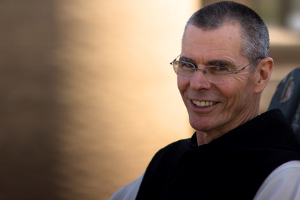Funeral Mass of Br. Felix Leja

Today, when we make final commendation to the Lord of our Br Mary Felix Leja and bury his mortal remains, is the liturgical feast of the evangelist Saint Mark. Br. Felix was baptized in the Church of Saint Mark in Chicago. It is one of those whimsical coincidences in which in our Catholic view of things, we look for meaning, Saint Mark as embracing arms around Br Felix's Christian life, Saint Mark at the beginning and at the end.
"The beginning of the Gospel of Jesus Christ, son of God," is how Mark starts his written Gospel. What he means is, the Good News, the Gospel, begins with Jesus, but is continued and carried on by the Church and by every Christian. Jesus' proclamation and Mark's written text are a beginning that has no end. Mark's text concludes with the commission, "Go into the whole world and proclaim the Gospel to every creature." It is a commission that has no end but only a fulfillment in the new heaven and the new earth.
The Markan coincidence marking Br Felix's life is there to underscore that for him, for each of us, and for the entire created cosmos Jesus, the Son of God, is the Alpha and Omega; Jesus is the beginning and the end, the Good News of God dwelling with the human race, God always with us as our God, an end that is pure duration, an end that has no ending.
"What is past is prologue."
The death of a Christian makes that point. A Christian death, a monk's death, begs us to see and affirm and honor the life just ended as the beginning, the overture, and still of a piece, of the life he has passed into.
"What is past is prologue."
"I saw a new heaven and a new earth, the former having passed away"; Dead with Christ, we shall live with him, buried with Christ, we shall walk in newness of life. Br Felix's terrestrial life, his Christian life starting from the baptismal font of Saint Mark's parish, Chicago, then his sixty-five years as a monk of New Melleray, is all now the past that is shown to have been the prologue to a life that has no end. Like all who die in the Lord, Felix has been snatched by the divine thief from the power of death, is being served by his master, himself warm with wine, at the endless wedding feast of the Lamb, and is radiant with the glory of the Son of Man.
"What is past is prologue."
The life of a monk, the past that is prologue to the glory of an endless present, is itself only occasionally evidently glorious. Mostly, it is dull and mundane, a monk's life, especially, our present that will one day be our past, and that will then be seen as prologue.
Next to Br. Felix's bed in his monastic cell was a volume of the apophthegma partum, the Sayings of the Desert Fathers. In the margins here and there you can see a very tiny penciled check mark. I presume the checks are against sayings that spoke to Br. Felix.
One is the famous one of Abba Moses, "Get thee gone, and sit in thy cell, and thy cell shall teach thee everything." Another is, "If we take upon ourselves to hold our peace, the example alone will be sufficient to make our neighbors do the same." And also, "Thou must not rejoice in that which causes evil to thy neighbor," and this from Abba Antony: "He who liveth in the desert is free from three kinds of spiritual attacks, that is to say, those that arise from the ears, speech, and sight; he hath only one kind to fight, namely, that of the heart." "If thou canst not set thyself straight first of all with men thou wilt never be able to live by thyself," said Abbba Longinus. Here is the life of a monk, of a Christian, particularly the life of Br. Felix, his past that has been prologue It is preaching the Good News to every creature by, as Abba Benjamin said, "Rejoicing at all times, praying without ceasing, and giving thanks for everything."
"What is past is prologue."
It was William Shakespeare who said that. I don't know if Br. Felix read Shakespeare much, but another coincidence is here: Shakespeare died on April 23, the same date as Br. Felix's death, 400 years ago, and was buried on this very date, April 25. "We are time's subjects," said the Bard, "and time bids be gone."
I asked Br. Felix what he wanted me to say in his funeral homily. He smiled and said, "He was here, and now he is not."
"To thine own self be true, and it must follow, as the night the day, thou canst not then be false to any man."
"What is past is prologue."
